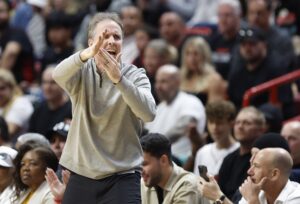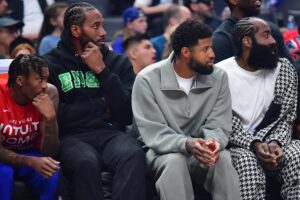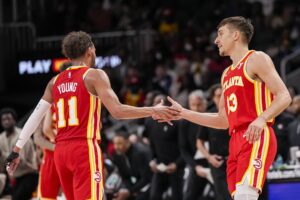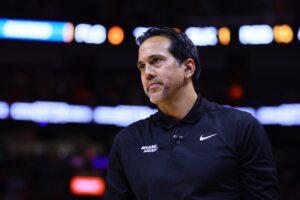Founded in 1946, the National Basketball Association has entertained the sporting world with incredible feats of athleticism, drama-filled moments, the highest of highs (and at times, the lowest of lows), and memories that fans will never forget. In this Last Word on Pro Basketball series, we’ll be remembering key historical figures and events that took place on this day. Let’s look back in time and reflect on moments that had a profound impact on the NBA.
Charles Barkley Named 1992-93 NBA MVP
On this day back on May 25, 1993, beloved analyst and basketball legend Charles Barkley was awarded the NBA’s Most Valuable Player award. In this article, we will be looking at the events leading up to the trade that sent Barkley from the Philadelphia 76ers to the Phoenix Suns and revitalized the career of the “Round Mound of Rebound.”
Hitting a Playoff Wall in Philadelphia
Prior to his MVP award-winning season, Charles Barkley had spent the first eight years of his career with the Phildaphelia 76ers after being drafted 5th overall in the legendary 1984 NBA Draft; the same draft that featured future NBA Hall of Famers Hakeem Olajuwon, John Stockton, and Michael Jordan. During his tenure with the 76ers, Barkley would average 23.3 points, 11.6 rebounds, and 3.7 assists per game. In that time, Barkley would play alongside fellow NBA greats Julius Erving and Moses Malone. However, Barkley and the 76ers would struggle to make a deep post-season run in the NBA Playoffs.
Although 76ers would make the playoffs six out of eight years with Barkley, Philadelphia was never able to make the Eastern Conference Finals. The most playoff success the 76ers experienced with Barkley was during the 1986 NBA Playoffs, Barkley’s second appearance in the playoffs. Philadelphia would fall to Sidney Moncrief and the Milwaukee Bucks in seven games. As expected, Barkley produced incredible numbers across the board for the 76ers; averaging 25 points on 58% shooting, 15.8 rebounds, and 5.6 assists during the 1986 NBA Playoffs.
Frustration Leading to Trade Demands
As playoff success became hard to come by for the 76ers, frustrations would begin to mount for Barkley. As one of the absolute best NBA players, Barkley was beginning to see his window for championship competition beginning to close in Philadelphia. After failing to make the playoffs at the end of the 1991-92 NBA season, Charles Barkley would demand a trade out of Philadelphia; with hopes to find deep playoff success and an NBA championship elsewhere.
For the outspoken Barkley, a trade out of Philadelphia was something that lingered on his mind for several years. In a 2016 interview with Sports Illustrated, Barkley explained the frustration he was feeling while with the 76ers. “The only regret I have is I would have been traded out of Philly sooner because my last two years there were miserable. I was going to be traded every week. I finally had enough and said I’m not playing here anymore.” explained Barkley. “So I would have left Philly two years sooner. They once had me on the cover of the Sporting News one year with six different uniforms because everyone was trying to get me.”
There was no shortage of aspiring trade partners for Barkley and the 76ers. In fact, a trade agreement between the Philadelphia 76ers and the Los Angeles Lakers was virtually completed but the 76ers had retracted the deal at the 11th hour.
On June 17th, 1992, the Philadelphia 76ers traded then 6-time NBA All-Star and perennial All-NBA mainstay Charles Barkley to the Phoenix Suns in exchange for Andrew Lang, Tim Perry, and Jeff Hornacek. This worked out well for Barkley because Phoenix did not have to part ways with the team’s best player Kevin Johnson.
A Much Needed Change of Scenery
Following the trade to Phoenix, Charles Barkley would join Danny Ainge, Dan Majerle, and Kevin Johnson as he looked for a fresh start in his ninth season. In Barkley’s first season in Phoenix, the 6’6″ power forward would lead the Suns while averaging 25.6 points, 12.2 rebounds, and 5.1 assists per game.
Charles Barkley’s presence made an immediate impact within the organization. During the 1992-93 NBA season, the Phoenix Suns enjoyed one of their most successful seasons in their franchise history. In large part due to the acquisition Barkley, the Suns began the season with a record of 21-4 that saw the Suns enjoy a 14 game winning streak in the month of December. With a record of 62-20, the Suns clinched their then-second Atlantic division title and 1st place throughout the Western Conference.
With the Phoenix Suns taking the form of a legitimate NBA Championship contender, the league awarded Charles Barkley the NBA MVP on May 25th, 1993.
En Route to the NBA Finals
Heading into the 1993 NBA Playoffs, the Phoenix Suns were riding a hot wave of momentum. With Barkley at the helm as league MVP, the Suns had all the makings of a true championship contender on the heels of a very successful regular season.
In the first round of the Playoffs, Barkley and the Phoenix Suns were matched up against a formidable Los Angeles Lakers team led by Vlade Divac, Byron Scott, and James Worthy. Despite the momentum that Phoenix garnered throughout the season heading into the playoffs, the Lakers had the Suns on the ropes in the first round. In their best-of-five series, the Lakers won the first two games in Phoenix. Facing elimination, Barkley and the Suns bounced back and won the next three games; advancing to the second round.
In the second round of the Western Conference Playoffs, the Phoenix Suns were matched against “The Admiral” David Robinson and the San Antonio Spurs. The Spurs and Suns were not strangers to each other as the team had met in the first round of the 1992 NBA Playoffs. For the second consecutive post-season, the Suns eliminated the Spurs 4-2.
In the second round, Barkley would average 26.2 points on 45% shooting, 13.2 rebounds, and 3.3 assists per game.
Western Conference Finals
In an instant classic, the Phoenix Suns and Seattle Supersonics would do battle in one of the most exciting playoff matchups of all-time. Led by defensive stalwart Gary Payton and the high-flying Shawn Kemp, Seattle was poised to give the Suns their toughest playoff challenge and advance to the NBA Finals for the first time since 1979.
In a back-and-forth battle that went a full seven games, the Suns had successfully defeated the Supersonics. In the final Game 7, Barkley was an unstoppable force on both sides of the basketball. With 44 points (on 60 percent shooting) and 24 rebounds, Barkley and the Suns were on their way to the 1993 NBA Finals.
This marked the franchise’s second NBA Finals appearance. The first was in 1976 in which the Suns fell short to the Boston Celtics, losing in six games. The Phoenix Suns would represent the Western Conference against the defending back-to-back NBA Champion Chicago Bulls.
1993 NBA Finals – Charles Barkley vs. Michael Jordan
Heading into the Finals, Barkley felt it was his time to finally win the championship that had long alluded him. According to the Chicago Tribune, Barkley believed it to be his “destiny” to the 1993 NBA Finals. “I believe it’s our destiny to win a world championship,” explained Barkley. “We’ve believed that for the last year. We didn’t care we were down 3-1. God wants us to win a world championship. I talked to him the other night.”
However, in any story that features Michael Jordan in the NBA Finals, it’s common knowledge how the series will unfold. “Charles said destiny was on the Suns’ side,” said Jordan. “But tonight we proved destiny was on our side”. Jordan was named Finals MVP after averaging a staggering 41 points per game.
Losing in six games, Phoenix would fall to Chicago as the Bulls completed their first NBA Championship three-peat. In his only Finals appearance, Barkley averaged 27.3 points, 13 rebounds, as well as recording a triple-double in Game 4.
Although the final result was not what he wanted, Charles Barkley had successfully put himself in a position for success. After hitting the playoff wall with Philadelphia for so many years, Barkley had finally reached the NBA Finals. Barkley and the Suns ultimately find themselves on a victim’s list of Michael Jordan and the Chicago Bulls championship teams.
Main Photo






